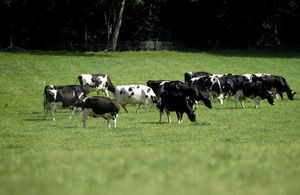Environment Secretary announces measures to support British farmers
Ahead of an extraordinary Agriculture Council, Environment Secretary, Elizabeth Truss sets out initiatives to support farmers

Urgent support from the EU to help farmers overcome cash flow problems stemming from the current low prices for milk and other produce will be called for by Environment Secretary Elizabeth Truss tomorrow.
Ahead of tomorrow’s extraordinary Agriculture Council meeting in Brussels, which will discuss options to help farmers through the current tough times, the Environment Secretary will urge the Commission to take action to relax some of the checks required on CAP subsidy payments to allow payments to dairy farmers to be made as early as possible when the payment window opens in December.
The Environment Secretary has also set out a range of initiatives underway to improve the long-term stability of the dairy industry and help businesses grow and thrive. These include an industry-led review of best practice in the dairy industry, developing proposals across the food supply chain to better label and promote British dairy, and a new review of public sector food-buying habits to understand where more support could be offered to local dairy farmers.
Environment Secretary Elizabeth Truss said:
I recognise the seriousness of the current situation for our hardworking farmers and I will be pushing the EU Commission tomorrow for urgent action to help them through this turbulent time.
Dairy farmers are a vital part of our £100billion food and farming industry. I want to support the industry to become more resilient and ready to take advantage of the growing demand for British dairy both at home and overseas.
That’s why we are urgently pursuing a range of measures to build on best practice in the industry, provide better promotion of our world class products, and boost support for local producers from the public sector including government departments, schools and hospitals.
At Agriculture Council tomorrow, the UK government will also call for:
-
Development of a dairy futures market, similar to those that already exist for grain and sugar. This would help the industry through periods of unpredictable price shifts and give farmers more certainty over future prices. It will ask the EU Commission to convene a specialist task force to develop proposals.
-
Increased transparency in the dairy supply chain across Europe to help ensure farmers are being treated openly and fairly and to provide consumers with greater certainty about where the milk in dairy products comes from.
-
Action to open new markets and reduce tariffs into existing export markets.
To help improve the resilience of the British dairy industry and provide a firmer footing for businesses to take advantage of the growing demand for British produce, the Environment Secretary will tomorrow set out a series of initiatives including:
-
An urgent industry-led review of best practice in the dairy supply chain facilitated by the Agriculture and Horticulture Development Board.
-
A new commitment to publish details of central government catering contracts, including their renewal dates, to bring transparency to the market and allow dairy farmers the opportunity to prepare and compete for contracts.
-
A review of buying habits across the wider public sector, including hospitals, schools and prisons. This will identify where local dairy producers could be better supported and build on the progress within central government – which is already generating £11million of business for dairy firms by ensuring that all fresh milk and more than 90 per cent of butter and cheese bought in central government is British.
-
Improving the promotion of British dairy within the public sector by working with major catering providers. For example, Compass Group UK & Ireland has already introduced ‘Know Your Food’ boards into their restaurants to highlight the provenance of the food served.
-
Using the Food is GREAT brand to showcase high quality British produce at home and overseas.
-
Working with the food industry – including supermarkets, retailers, manufacturers and caterers – on more consistent labelling and branding of British dairy products, improving transparency across the supply chain and allocating more space on shop shelves. This will make it easier for consumers and food businesses to know when they are buying British dairy products.
-
The Environment Secretary will lead a trade delegation to China in November including eight British dairy businesses to promote quality British products to this growing market. This is part of our commitment to expand export market opportunities – which grew to a record £1.4billion for dairy in 2014.
Gwyn Jones, Chairman, AHDB Dairy, said:
Following the Environment Secretary’s meeting with farming unions last month, an industry working group was asked to look urgently at best practice models on labelling, merchandising and sourcing for dairy. This group, independently facilitated by the AHDB, is up and running and has already submitted key areas to Defra for the group to work on. In the coming weeks the group will submit proposals on changes that could be made, based on industry views.